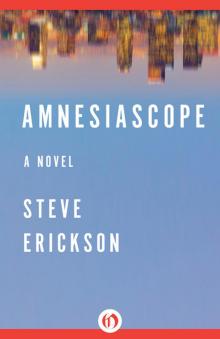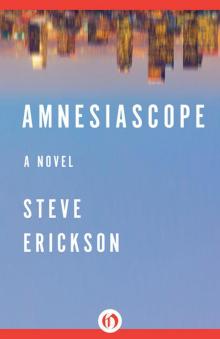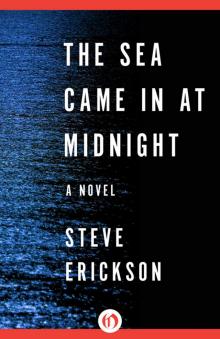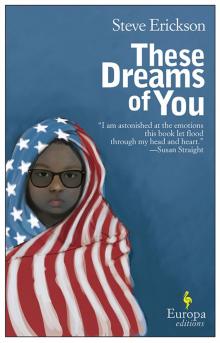- Home
- Steve Erickson
Days Between Stations Page 5
Days Between Stations Read online
Page 5
Then, the first of the sandstorms came. She watched it from her window—a mild one, compared to the ones that would blow through the city later. It left a fine silt on the buildings, and took some of the paint off the cars. All the windows were left like round portholes, the sand filling the corners; and there was the slight rattle of sand on the roof. Sand fell with the opening and closing of doors, and in the dark people wore sunglasses to keep the sand out of their eyes. Since their apartment, and the window she watched from, faced the west toward the ocean, she could never see the storms approaching, coming from the deserts in the southeast as they did; but people began watching for them from their moonbridges in the day, sighting the black cloud far away on the edge of the Santa Ana Freeway, and from the bridges at night as the storms cast a gauze across the moon itself. The second and third storms came two weeks after the first, and they were worse. There were four blackouts in those two weeks; they had never before been so frequent. With the fourth storm one afternoon, she saw from her window the clock stop, the table light die, and caught the motion of cats scurrying; then the sky went brown, and the windows shook as if they would shatter. It was like that, with her back to the east—no warning; the storm suddenly upon her; it was terrifying like that.
Jason left again, and this time they had a terrible fight on the eve of his departure. He finally admitted to Lauren that there was no race this time, that he was going to see his son. You care more, she said, about that son than you ever cared about our son. It’s the only son I have, he said; and she answered, I suppose you blame me for that. He walked out wordlessly.
Those weeks alone she thought about Michel. She listened to him come and go downstairs, and watched from the window when he walked down the street in his long blue coat. Alone, with nowhere to go, and no one with her, she went over and over the past in her mind, looking for his face in the places she had been, among the hours that were hers. She could never find him. When his door opened and closed below, she listened for his steps on the stairs, wondering if he might come talk to her. Once, twice, she thought she heard him approaching; but he never did, leaving only the trace of his form in the street below, gliding across the sand. And when Jason came back, and they muttered their ritual greetings to each other (the previous conflict never having been resolved), the first question he asked of her, the first one that was not ritual but of which he seemed to care about an answer, was of Michel, and whether she had seen him.
She was vaguely astonished. “No,” she said. “Why would I see him?”
“He lives right below us,” said Jason.
“He’s lived right below us for two years,” she said. “Why would I see him now?”
He shrugged. He seemed noticeably relieved. “I was just asking,” he said. “I thought you might go down to the Isosceles with him, or something.”
“Why would I do that?”
“I don’t know!” He abruptly went back to unpacking. She had never seen him like this before.
“Do we know him from somewhere?” she said.
“I don’t think so.”
She just nodded.
That she somehow felt it important to talk to Michel again did not, in her own mind, in the rationale she presented to herself, imply more; so she couldn’t explain why she felt as she did when Jason told her Michel had invited them to the Blue Isosceles as his guests. All day she prepared for it. She took her red velvet jacket and hung it in the shower, turning on the hot water so the steam would make the fabric glisten; for an hour the bathroom billowed, until the ceiling dripped and the walls ran with sweat. She took a bath exactly seven hours before they were to leave, for she had calculated her skin looked best not immediately after bathing but later, when it regained its glow, and her hair could dry in curls. All afternoon she took care not to mar herself; she stayed away from the window when the sun sank westward, so the glass would not make her perspire, and it was the sheerest coincidence that the one time she did go near the window she looked down into the street to see him standing there shaking a rug. He turned and looked up, and she backed away from the window quickly—surely soon enough not to be seen. She stared at clocks. She pressed her ear to them sometimes to make sure they hadn’t stopped; she clicked on lights sometimes to make sure the power hadn’t failed. She tried to read. She waited until her hair was dry to nap, and then propped herself up against the pillows so her curls would not be flat when she awoke. She couldn’t sleep anyway. Some moments, only a few, she felt calm enough to realize that, for the first time since Jules had died, she felt she was alive. She didn’t want to understand it.
At seven she put on lipstick. She hadn’t worn it in years. At a quarter past seven she took off the lipstick and put on a different color. At seven-thirty she took off that lipstick and resolved to wear none. At seven-thirty-five she resolved to wear the lipstick after all.
She wondered if Jason noticed how she had doused herself in perfume. She panicked, thinking that perfume was too much. She considered bathing again. But then the hair would be undone. Then she put on more perfume. She held her jacket up to the light to see that it still glistened.
When they left, Jason watched her.
They didn’t talk on the way to the club. She found herself forgetting Jason altogether. Something in her stomach tightened at the box office, when Jason gave the girl behind the glass his name. The girl looked on the list. She couldn’t find his name, and something shot through Lauren. The girl found the name, and Lauren exhaled. There was even a complimentary tab, for drinks; they were led to a special table upstairs, overlooking the dance floor below. The waitress came and took their order. Lauren tried to sound casual when she looked across the table to Jason and said, “Is Michel joining us?”
The waitress said, “The manager never drinks with guests.”
Lauren sat through the first band hearing nothing. There was the usual commotion on the floor below, the same smell of gasoline. The waitress doesn’t know, Lauren told herself. We’re Michel’s guests. The set ended after forty minutes. The waitress came again, and Jason ordered two more drinks. Lauren didn’t care if Jason saw her looking around the room. Jason seemed calm and unperturbed, the way he usually did, as though nothing could threaten him at all.
She was staring off into space when she suddenly turned and there he was.
Michel and Jason talked. Michel signaled the waitress and ordered a drink. “A landmark,” the waitress said to Lauren. Jason said he’d have another beer. Michel looked at Lauren for the first time. “No, thank you,” said Lauren, holding her glass. Michel shrugged. The waitress left.
Jason went to the toilet. Michel and Lauren sat at the table, neither saying anything. Lauren was afraid to look up, certain he was staring at her; but when she did, she saw him just rubbing his finger along his lip, looking at the people at the bar, gazing past the rail to the stage. The patch was on the eye closest to her, and it was clear he didn’t realize she was there at all, he was thoroughly indifferent to her. She became very aware of all the perfume. She became aware of the slight red of the lipstick on the rim of her glass, and she just watched it. Jason returned.
The second band came on. Somewhere into the second song, Michel pushed back his chair, got up, made a casual farewell gesture with his hand, and walked away. She stared after him. She was sure he would come back. She was sure he had something to say to her. He disappeared, and then near the end of the band’s encore, some thirty minutes later, she watched him reappear. She hadn’t moved her gaze at all. He was wearing the long blue coat, and talking to a waitress, then talking to someone behind the bar. He moved through the crowd, which was calling for another encore. He spoke to someone at the door. He pointed to the stage, pointed to the stairs. He was right below her, as he had been when he shook the rug beneath her window. He never looked up. Then he was gone.
After the show Jason took her to a bar. She had a kahlua and cream. He talked to her the entire time, sometimes watching the women who passed their table.
She interrupted him at one point. “I want to go home,” she said.
“Have another—”
“I want to go home.”
In stately devastation she watched out the truck window on the way home, peeling with her front tooth the gloss on her lips. The night was pitch black, and nothing was illuminated but for what she believed to be a winged cat gliding over the buildings, though it could easily have been a hang glider who drifted in from the beach. As their truck ascended the hill to the steps that led up to Pauline Boulevard, there were frozen in the gutters people wearing heavy overcoats to protect themselves from the sand; only their heads pivoted slowly. The windshield of the truck was stained with salt. There was no moon and a low fog. They walked up the steps and the street was totally dark. “I thought we left on a light,” said Jason, staring at their window. From the top of the steps overlooking the city could be seen a long line of headlights moving toward its destination very slowly—a procession in a city black and shrouded. Unlocking the outside door at the bottom of the building, Jason stepped in and touched the hall light switch. The hall remained dark. “Shit,” said Jason. “Another blackout.” Lauren leaned against the wall, silently staring before him. “What’s the matter with you?” said Jason.
She shook her head.
“I’m going back to the truck to get the flashlight.”
She nodded.
“Wait here,” he said.
“I’ll go on up.”
“Wait until I get a light before you go up the stairs.”
“I’ll go on up,” she said, pulling her arm from his hand. She could tell he was relieved that she was dead again. She moved up the stairs slowly, never holding the rail, her arms still folded. Everything about her that had lunged through the day stopped now. She didn’t even have it in her to feel foolish or resentful. She was vaguely grateful for the dark. She was somewhat amazed that she felt like crying; it had been a long time since she’d done that. Not since Jules.
She got to the second level, and then moved onto the third. At the third she stepped around, onto the stairs to climb to the fourth and last, when some part of the night seemed less lost than the rest. It seemed to throb at the end of the corridor, a blackness not so muted but deeper than the blackness around it, as though it were a part of the night that had absorbed more light and was therefore exiled by the rest of the darkness around it, cast into something more forbidden. She stood on the stairs and looked at it, listening, and in a blackness that would not have allowed her the sight of her own hand inches from her eyes, she saw the exile move.
She said nothing. She didn’t call to it. Outside the window some high-pitched tone came smuggled by the wind, and she couldn’t decide if it was an animal or a squeal of brakes in the street. She listened for the sound of Jason returning, and she thought about the way she felt the first time she saw Michel. She felt now, there on the stairs, invulnerable to mundane clocks and the pending reflow of power that would set them humming again. The exile moved again, to some place close to her, and then its cessation stunned the room; she stood with nothing left to survey, nothing to touch, nothing outside to hear; and everything was exposed in the dark. She stood motionless, barely breathing, her toes on the edge of the stairs, with its surrendered steps and destination in nihilistic disarray, saying to herself, Do something, though she never wanted to leave here. She commanded herself up the stairs and disobeyed repeatedly; she never expected anything of him. That would have been assuming too much. He could not know that she’d lost Jason, since she didn’t admit that to herself; he could not know she’d lost the ring on her finger, since she had taken it off herself; he could not have predicted the decisions she’d made, since she hadn’t yet made them. She could not have thought that he would sense her own passages through halls of limbo, since she hadn’t chosen the doors; rather, he would have to be attuned to the sort of sadness that no man she’d ever known had ever understood: certainly not Jason. She could not, in short, know he wasn’t like Jason; and he, she assumed, could not know what Jason was like, and what therefore the marriage had done to her. Neither of them should have known these things except that now there was nothing left to survey, or touch, or hear outside, nothing to feel but the things that neither could know of the other; and therefore they felt everything. Not the details or the definitive traumas but the resulting carnage by which each had been ravaged. And when the sound of Jason’s steps came up the street, she felt on her face one tear; and then her husband’s footsteps slammed through the dark outside. She raised her fingers before her and felt a face inches before her eyes, and it was as though a line draped between them was yanked taut. There was the sound of Jason’s voice; and she moved her fingers across the face lightly, till their tips touched the fabric over one eye, and if she thought to mutter anything at all he caught the sound of it in his mouth. When he would not break from the kiss and his face wouldn’t leave hers, she took the palms of her hands from his bare chest and slid them to his bare shoulders, around his back, until she pulled him to her more. His fingers were in her hair. “Lauren,” came Jason’s voice from downstairs. A hand caressed her chin, and she turned her head slightly and bit the hand hard. It didn’t move from her face. She looked everywhere in the dark for him, and she knew he was looking too. Both of them had known, the moment before he touched her, what it would be like, how it would feel. Both of them knew, the moment he kissed her, that in another time and place, they had done it before.
“Where do I know you from?” she heard him whisper.
“I don’t know.”
“But we’ve met before,” she heard him say.
“Yes, we have.”
“Two years I’ve never seen a living face that was anything but strange,” she heard him say. “Then I saw yours, and I knew it. Like the faces I know in the movies.”
“Lauren,” came Jason’s voice, and the hand moved from her face. She reached out to hold it. “Lauren!”
“Yes.” The beam of Jason’s flashlight slashed the staircase. Light flooded the hallway, and the city.
“Wouldn’t you know it?” he said from the stairs. “No sooner get the flashlight and the power comes back.” She stood on the same steps, looking at the corridor before her. It was empty. The neighbor’s door was closed.
Jason’s head appeared on the stairs. He looked at her. “Did you lose count?” he said. “We’re another flight up.”
She looked at the door, and nodded.
“Afraid of the dark?” he said.
“Afraid of the dark,” she said.
She woke in the middle of the night wondering if it had happened. She lay on her side and stared at Jason’s back. She listened for sounds from below. She tossed and turned and got up and went to the window like always, searching for an answer, like always. She wondered about the cats, and then went into the bedroom, looking in the mirror. Everything hummed; if it was a dream, no waking moment had ever touched it. Something leapt inside her when she saw, in the mirror, in her hair, something caught that had never been there. It came easily between her fingers, unattached: a short, thin strand, very dark, from a patch of black fabric.
Then she was in pain. It began with odd twinges that escalated to a long ripping throughout her womb; she felt it the rest of that evening. She ran to the toilet, hideously sick, blood and liquor streaming into the bowl beneath her.
The next day she thought of him. And the rest of the week, wondering when she would see him again. She thought of calling him at the club but did not. Then Jason left again, this time for the East Coast, from where he was to go on to Europe, and for once it seemed he departed reluctantly. On the morning after he was gone she knew she would go to Michel. There was a blackout. It was hot that day, and when the power came back on across the city she went through the refrigerator discarding spoiled food. She ignored the pain but was sick again that afternoon.
That night she lay in bed clutching her belly. She got up a half dozen times to go to the toilet. The last time
she lay on the bathroom floor with her head against the porcelain seat, falling asleep and waking, looking at the electric heater with its grill and doubled coils. She had a dream about the coils, winding up her uterus; and she woke dreaming that the coils were skewering her insides.
She rose from the bathroom floor in terror. She went to the closet and pulled from the hanger a white cotton summer dress, and got it over her head. She thought about calling him. She said to herself, He won’t want to deal with this, he’ll hate me for imposing it on him. She had dialed the phone when it slipped from her hand and she slipped from the chair to the carpet.
That night he got off the bus one stop early, and walked. He cut up from Sunset and past the apartments, entering Pauline Boulevard from another direction, and walking the length of the street to his building at the other end. There was a light in her window. Though it was quite late, and there weren’t many lights in the windows along the streets, there did come from each residence a glow from the television set. Ever since the blackouts started, the television stations had taken to showing old films of the first moonwalk. Now the stations ran the films over and over all the time, and people simply left their televisions on, since it took more power to turn them off. In window after window, as Michel walked home, he saw men and women holding their sleeping babies, staring at their living room screens without emotion, without recollection, as the moonwalk flickered on into the night.
Later in bed he heard a sandstorm blow in from the deserts, and the building swayed in the silt like a shipwrecked vessel hoisted onto its keel in the mud sea bottom. The sheen of dust scraped the barnacles on the sides. He had seen Jason leave the morning before and now his body didn’t let him sleep. He tossed and turned and went to the window to see if the light of her apartment shone on the sand below. It was finally the steady muted scraping outside that made him drift off.
He awoke at five-thirty in the morning when it was still dark, and went to see if her light was still on the sand. When he saw that it was, he listened for something upstairs—a sound to let him know she was waiting for him, as though the hush of the dust was the sound of her thighs rustling together. He glared at the ceiling with his one free eye, as though he could drill a hole through her floor.

 ARC D’X
ARC D’X Amnesiascope
Amnesiascope Our Ecstatic Days
Our Ecstatic Days Amnesiascope: A Novel
Amnesiascope: A Novel Zeroville
Zeroville The Sea Came in at Midnight
The Sea Came in at Midnight These Dreams of You
These Dreams of You Zeroville: A Novel
Zeroville: A Novel Days Between Stations
Days Between Stations (1993) Arc d'X
(1993) Arc d'X Full-Blooded Fantasy
Full-Blooded Fantasy